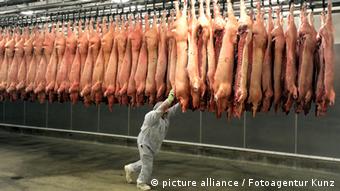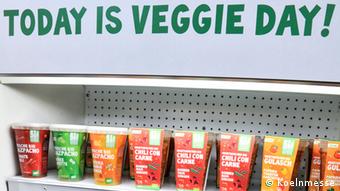EU measures to stabilize pork prices were ineffective, experts say. German pigsters hope that the increase in demand in the summer season will spur the cost of their products.
Pork is not in price: German farmers hope for the Barbecue season
EU measures to stabilize pork prices were ineffective, experts say. German pigsters hope that the increase in demand in the summer season will spur the cost of their products.

With the approximation of summer, the Germans are increasingly chosen on green lawns and balconies of their apartments to arrange a barbecue. For meat manufacturers, the Grill season is the most profitable time: the demand for their products is growing steadily, and prices are gradually crawling up with it.
For the current season, Barbecue German producers of pork have particularly high hopes. After in January last year, Russia introduced the import of this type of meat from the EU countries, and in August, in response to Western sanctions, it completely banned the import of European meat and meat products, German pigsters suffer serious losses. According to the German analytical company AMI, from March 2014 to March 2015, casual prices for pork in Germany fell by 7 percent. The retail price has decreased by 1.7 percent.
To support European pigsters and stabilize their products, the EU organized a private storage of excess meat on March 9, which formed due to the loss of one of the largest sales markets for Europe. The size of subsidies allocated to pigsters varied from 210 to 305 euros per ton, depending on the type of product and storage time. On April 29, the European Commission announced the closure of private storage and summed up the results of the Sig’s support program. Its results at the request of DW were appreciated by German experts.
The European Commission summed up
For almost seven weeks of implementation of the program, market prices for pork in the EU were stabilized, the statement published on the website of the European Commission said. In these conditions, the commission believes that there is no need for further interventions on the market, the document says.

The embargo introduced by the Import of meat from the EU hit German pigsters
The support program was used by farmers from 18 countries of the European Union. According to the data provided by the AMI, they sent a total of about 65 thousand tons of pork for a period of 3 to 5 months for storage. The largest volumes of meat, 15.25 thousand tons, were sent for storage in Denmark. In second place was Spain, where 9.3 thousand tons of pork were loaded into the refrigerators. In third place in Germany is 7.96 thousand tons.
In smaller volumes, manufacturers from Poland, France, Italy, the Netherlands, Belgium and several other countries took advantage of the program. Most European farmers chose to poison their products for storage for three months.
Support without effect?
When at the end of February the EU announced the opening of temporary storage, German industry unions and industry experts criticized this initiative, saying that it was untimely, since at that time the prices for pork were already several stabilized. Now, evaluating the results of the implementation of the program, some of them repeated this point of view.

On the wave of vegetarian paper, meat consumption in Germany is reduced
Such measures had to be taken in December or – the latest – in January, when the price reached its bottom of 1.28 euros per kilogram of slaughter weight, said in response to DW Matthias Kohlmüller, heading the Analysis Department of meat industry in AMI. According to him, the effect of opening private storage turned out to be insignificant: the introduction of this measure had minimal support for prices.
“After a short -term upward trend, pork prices again fell to the previous level of 1.40 euros per kilogram,” the expert of the German pig farms (ISN) Matthias Quaing indicates. “That is, prices did not increase at all. She had an effect.
On the wake of the vegie
With colleagues from ISN, they also agree in the German Union of Peasants (DBV). The association noted that the opening of private storage of excess meat did not have any tangible effect on prices. After 3 months – namely, for such a period, German farmers sent 72 percent of the products to be temporarily stored to the refrigerators – these volumes will return to the market, warn in DBV. They are afraid that the return of excess pork to the market will exert even greater pressure on prices.


